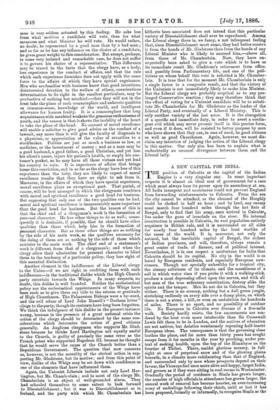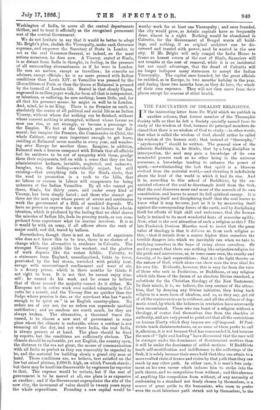A NEW CAPITAL FOR INDIA.
THE position of Calcutta as the capital of the Indian Empire is a very singular one. In some important respects it is almost an ideal seat of government for a race which must always base its power upon its ascendency at sea. All India insurgent and unanimous could not prevent England
from forwarding reinforcements to Calcutta. From the sea the city cannot be attacked, as the channel of the Hooghly could be choked in half an hour ; and by land, any enemy must march four hundred miles through the hot flats of Bengal, only to find that his army, once arrived in Calcutta lies under the guns of ironclads on the river. No internal insurrection is possible in Calcutta, its vast population entirely acquiesce in British rule, and it is surrounded on all sides for nearly four hundred miles by the least warlike of the races of the world. It is, moreover, not only the natural, but the inevitable capital of Bengal, the richest of Indian provinces, and will, therefore, always remain a great centre of trade, of finance, and of political interest.
Nevertheless, it is in one respect a misfortune for India that Calcutta should be its capital. No city in the world is so hated by European residents, and especially European new- comers. Though not specially unhealthy for a tropical city, the steamy sultriness of its climate, and the marshiness of a soil in which water rises if you probe it with a walking-stick, produce a most depressing effect upon the nerves, and with all but men of the true sedentary constitution, destroy alike the spirits and the temper. Men do not die in Calcutta, but they wither. There is no scenery, nothing but a dull green jungle, stretching endlessly on every side over a damp plain, on which there is not a atone, a hill, or even an undulation for hundreds of miles. There is no sport, and no possibility of outdoor life. No European in Calcutta ever dreams of a five-mile walk. Society hardly exists, the few amusements are ren- dered by the heat even more intolerable than Sir Cornewall Lewis felt them to be in London, and the natives of education are not natives, but Asiatics wearisomely repeating hall-learnt European ideas. The consequence is that the governing class loathes the place, and for more than thirty years has sought escape from it for months in the year by perching, under pre- text of seeking health, upon the top of the Himalayas on the frontier of Thibet. There, amidst glorious scenery, in full sight at once of perpetual snow and of the glowing plains beneath, in a climate more exhilarating than that of England, and surrounded only by men whose prospects depend on their favour, the Viceroys feel once more alive and happy, forget India, and govern as if they were sitting in cool rooms in Westminster. Gradually the period of residence in Simla has grown longer, the number of high officials in attendance has grown larger, the annual work of removal has become heavier, an ever-increasing army of underlings following their chiefs, until at last it has been proposed, formally or informally, to recognise Simla as the Washington of India, to move all the central departments thither, and to treat it officially as the recognised permanent seat of the central Government.
We chi not hesitate to say that it would be better to adopt Mr. Bright's plan, abolish the Viceroyalty, make each Governor supreme, and empower the Secretary of State in London to act as the real Governor-General, as indeed, on the most serious occasions, he does now. A Viceroy, seated at Simla, is as distant from India in thought, in feeling, in the pressure of all surrounding circumstances, as if he were in London. He sees no natives, except as travellers ; he consults no advisers, except officials ; he is no more pressed with Indian conditions than Louis XIV. at Versailles was pressed by the ill-conditions of Paris, or than the Queen at Balmoral is pressed by the turmoil of London life. Seated in that cloudy Capua, engrossed in endless paper work, far from all that is independent, or laborious, or suffering, he sees nothing, hears little, and, for all that his presence means, he might as well be in London. And, mind, he is no King. There is no Premier on earth so absolutely the centre of all political and social life as an Indian Viceroy, without whose fiat nothing can be finished, without whose consent nothing is attempted, without whose favour no man can rise, or act strongly, or become a personage in the Empire. We fret at the Queen's preference for Bal- moral; but imagine the Premier, the Commander-in-Chief, the whole Cabinet, every man important enough to get leave, residing at Balmoral seven months in every year, and wander- ing over Europe for another three. Imagine, in addition, Balmoral such a heaven compared with Britain that all officials feel its residents to be out of sympathy with them, grudge them their enjoyments, toil on with a sense that they are but administrative hodmen, invisible, neglected, and unknown. Imagine, too, the feeling—wretchedly unjust, but still existing—that everything falls to the Simla circle, that the road to promotion is a rush to the hills, that no labour or success in labour will compensate for being unknown at the Indian Versailles. By all who cannot get there, Simla, for thirty years, arid under every kind of Viceroy, has been simply hated ; and those who cannot get there are the men upon whose power of serene and continuous work the government of a fifth of mankind depends. We have no power to express the want of tone in Indian admin- istration, which is produced by the feeling that no chief shares the miseries of Indian life, feels its pressing needs, or can com- prehend from experience what its routine involves. It is as it would be with an army, if all officers above the rank of major could, and did, travel by balloon.
Nevertheless, though there is not an Indian of experience who does not know this to be true, there is no chance of a change while the alternative is residence in Calcutta. The strongest Viceroy yields like the weakest, and the glutton of work departs like the veriest fribble. Calcutta, to a statesman from England, unacclimatised, liable to fever, prostrated by the hot steam, wretched with prickly heat, savage with unaccustomed confinement and want of air, is a dreary prison, which in three months he thinks it not right to bear. It is not that he cannot enjoy him- self ; he cannot do his work, and he comes to believe that of those around the majority cannot do it either. No European not in active work ever resided voluntarily in Cal- cutta for a month, and the Viceroy flies no quicker than the Judge whose pension is due, or the merchant who has "made enough to be quiet on" in an English country-place. No orders are of any use, for no orders. can supersede medical certificates ; and no resolves are worth much, for they are always broken. The alternative, a thousand times dis- cussed, is to choose a new seat of government in some place where the climate is endurable, where a resident is not steaming all the day, and yet where India, the real India, is always present or at hand. The place should be fixed by experts, but the conditions are sufficiently obvious. The climate should be endurable, yet not English, the country open, the distance to the sea not great, the means of communication with all India as perfect as they can reasonably be expected to be, and the material for building slowly a grand city near at hand. Those conditions are, we believe, best satisfied on the low but raised plateau, 2,000 ft. high, on which Poonah stands ; but there may be localities discoverable by engineers far superior to that. The expense would be serious, but if the seat of government is to be moved at all, one place is as expensive as another; and if the Government expropriates the site of the new city, the increment of value should in twenty years repay the whole expenditure. Founding a new capital would be
worthy work for at least one Viceroyalty ; and once founded, the city would grow, as Asiatic capitals have so frequently done, almost in a night. Nothing would be abandoned in Calcutta, for the Government of Bengal wants all build- ings, and nothing, if an original architect can be dis- covered and trusted with power, need be wasted in the new city. If Mr. Bright will only compel the India House to frame an honest return of the cost of Simla, financiers will not tremble at the cost of removal, while it is an incidental but not small advantage, that the dread of Calcutta will no longer indispose many statesmen to accept the Indian Viceroyalty. The capital once founded, let the great officials be entitled, as in Europe, to two months' holiday in the year, and during those two months bear, as they do here, the whole of their own expenses. They will not then move from their places except for reasons of strict health.



































 Previous page
Previous page